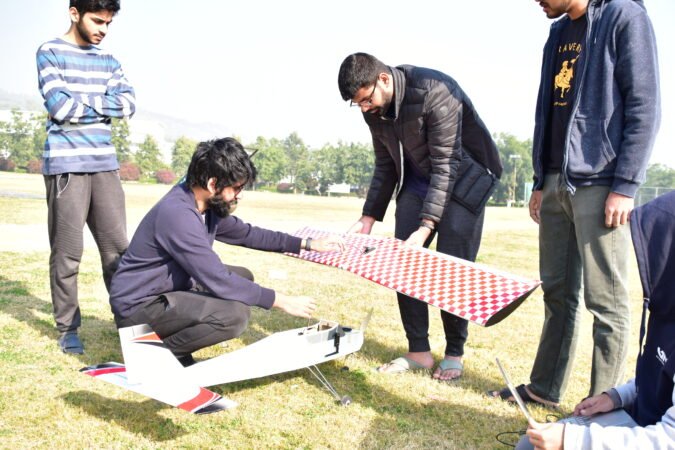Foxtrot is a student-run team based in Ghulam Ishaq Khan Institute of Engineering Sciences and Technology (GIKI), specializing in building planes, drones, and Unmanned Aerial Vehicles (UAVs). With a passion for developing UAVs and the intention of representing Pakistan and GIKI internationally, the team competes in the UAS (Unmanned Aircraft Systems) Challenge, which is hosted annually in the United Kingdom by IMechE (Institution of Mechanical Engineers).
Team Foxtrot is divided into several sub-teams: Design, Fabrication, Automation Systems, Imaging Systems, and Testing.
The IMechE UAS Challenge
The IMechE UAS Challenge has been held in the UK for the past seven years. The main challenge goal of the competition is to train and develop professional engineers, providing them with a dynamic and specialized environment to hone their problem-solving abilities.
A plethora of teams from around the world competes in this challenge. They perform timed tasks and follow a strict set of guidelines by performing a complete design and building cycle of UAS with specific goals prioritized. The main task for each team is to construct a UAV for the tasks to be completed successfully. These include area search, waypoint navigation, endurance task, dropping an aid package correctly, and consequently returning to the base via a well-defined route.

The challenge is divided into three major stages, which are as follows:
- Design
- Development
- Demonstration
Accomplishments
Team Foxtrot has competed in the IMechE UAS Challenge in the United Kingdom (UK). In the debut year of the challenge, they won the “Highest Place New Entrant Award of 2019” and stood among the Top 10 participating teams from across the globe. In 2021, Team Foxtrot bagged the Business Proposition Award while also finishing in an esteemed 5th place in the virtual competition.
The team also scored a perfect 15/15 score on its First Design Review: a feat that is worthy of appraisal. In this year’s challenge, the Team scored another perfect score of 20/20 on its Preliminary Design Review. The team was warmly welcomed by national media for their extraordinary achievements and invited for interviews by Expresso, Neo News, and PTV World.
Team Foxtrot also organizes STEM outreach programs in schools to enlighten them about the endless possibilities and opportunities in engineering and empower girls interested in the field. It focuses on enabling young minds to acquire UAV-related cognitive skills and teaching pupils about the practical applications of autonomous UAVs in the present period, including their use in humanitarian aid missions.
Generous sponsors have enabled them to receive these accolades in a short period. Their previous sponsors/partners include HBL, E-Wall, and FFC, whereas Smart Hobby and Woot Tech are our current ones.
This Year’s Challenger
This year’s project, Barq, is designed to complete all core tasks of the challenge besides the optional tasks of Endurance and Area Search. Project Barq is a CTOL (Conventional Take-Off and Landing) design having a tri-motor configuration to enable short take-off and precision landing within a limited 10 x 10 m area. The aircraft uses a V-tail and glider wings to combat air resistance and is fabricated of carbon fiber and polystyrene to maximize the strength to weight ratio. This also gives it high maneuverability and an enhanced endurance capability. In addition, it has retractable landing gears and a maximum take-off mass of 9.3 kg with a payload-carrying capacity of up to 3.5 kg.
It can fly to speeds of up to 60 knots and has a reverse-thrust mechanism. With appreciative feedback from the IMechE and all members working hard in their respective domains, Project Barq is all set to fly high and make us proud in the 2022 UAS Challenge.
Also, Read: Pakistan’s Team Foxtrot bags awards at IMechE UAS Challenge

Saadeqa Khan is the founder, CEO, & Editor-in-Chief of Scientia Pakistan. She’s a member of the Oxford Climate Journalism Network (Second Cohort) and NASW. Saadeqa is a fellow of NPF Washington, The Falling Walls Foundation, and the Science Journalism Forum. Saadeqa has won several international journalism grants and awards for her reports.

